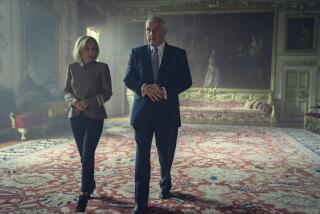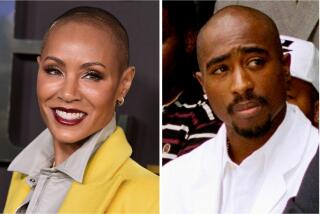Rap’s Prince Soon to Be TV Royalty?
Will Smith, a 21-year-old rapper who calls himself the Fresh Prince, just got a job with NBC. What is expected of him, as implied by his boss, NBC Entertainment president Brandon Tartikoff, are three things:
* To bring the black street world of hip-hop to American TV audiences.
* To star in a sitcom bearing his name that will be the network’s first “hit-the-ground-running hit” since “The Golden Girls” five years ago.
* To be a “big, breakout star” along the lines of, oh, say Eddie Murphy.
“Brandon Tartikoff is making me nervous, comparing me to Eddie Murphy and stuff like that,” Smith said not long after Tartikoff made the comments.
“Hey, hey, slow down a little bit.” He chuckled. “Let me practice first. This has all happened so fast my head’s spinning a little bit.”
“The Fresh Prince of Bel Air” is backed by first-time TV producer Quincy Jones. It’s about a funky byproduct of Philadelphia’s gang-infested streets who is sent out West to live with his wealthy upper-crust cousins, whose plush lifestyle has buried their black roots.
Smith quickly points out that the sitcom “is not about rapping. It took me a while to make NBC understand--and they understand now--they don’t want rap. They think they want rap performers, but no. What they want is a hip show.
“Rap music--which a lot of white America doesn’t understand--rap music is not just a music. Rap music is a subculture: hip-hop. It’s a style of dress, an attitude, a look, a language. It’s more than just music.”
A middle-class kid from Philadelphia who never acted before, Smith is being asked to shoulder a load that might wobble the knees of Murphy himself. He’s network television’s first embodiment of a fresh generation. He’s a prime-time tap into the urban street market, which is pumping rap music, loud new fashions and an Afrocentric political consciousness into mainstream society faster than the booming bass tracks of a def jam.
Warren Littlefield, Tartikoff’s right-hand man at NBC, said that the network had been searching for a way to catch the rap tiger by the tail for some time.
“We were all looking at Newsweek and Time and seeing these cover stories (about rap music),” he explained. “I was personally watching ‘Yo! MTV Raps’ and feeling waves of something new and contemporary running through various streams of culture in America. We felt there was a drum beat going on out there, and we looked at our development (schedule) and said, ‘It’s not represented.’ ”
Smith, half of D.J. Jazzy Jeff & the Fresh Prince, endeared himself to kids everywhere in 1988 with the sympathetic rap hit “Parents Just Don’t Understand,” about a shopping trip he takes with his mother for back-to-school clothes. Although the duo’s record sales have slipped since then, the bubble-gum rappers are still hopping. Their 900-number hotline, which will be used to promote an upcoming album, has set a music industry precedent by grossing a reported $10 million since its debut two years ago.
“I think Will’s a star,” said Jones, a celebrated music producer/composer with 19 Grammys to his credit. “He really makes it pop. He’s got this sense of timing that’s unbelievable. Right now he’s not even thinking about it; he’s just doing his own thing. He’s going to be dangerous when he finds out where the cameras are. “
The real-life inspiration for “Fresh Prince” came from co-producer Benny Medina. “It was partially based upon the way I was brought up, a juxtaposition I was thrown into at an early age,” Medina said. “I came from a broken home in Watts, and I was in and out of juvenile detention facilities and foster homes.”
Medina was living at St. Elmo Village, a community home center in Los Angeles, when Jack Elliot, a white TV and film composer living in Beverly Hills with a wife and three kids, decided to give Medina a chance. “They let me move in with them,” he said. “I fixed up their garage in the back of the house and became part of the family. The deal was I had to keep a job, keep the grades up and be respectful of household rules.”
Medina wound up at Beverly Hills High School with the children of Motown kingpin Berry Gordy and eventually started working for Gordy as a junior executive at Motown. Today, Medina is head of black music at Warner Bros. Recently, when he and partner Jeff Pollack began developing TV projects, including an animated series called “Hip-Hop Junior High,” Medina was thinking back to his childhood.
Medina met Smith in December backstage at “The Arsenio Hall Show,” which was celebrating Jones’ acclaimed comeback album “Back on the Block.” Smith asked Medina for directions to a Laker game. Not long after, Pollack began hearing secondhand raves about Smith after the rapper’s performance on Disney’s 35th-anniversary TV special for NBC. Director John Landis cast Smith in the special based on his energetic performance in the music video for “Parents Just Don’t Understand.”
Medina and Pollack contacted Smith, who hooked into the project immediately. “It was real,” Smith said. “That’s what everyone’s missing on TV. You’ve probably seen that Tide commercial where the kid stands up on the washing machine and starts rapping, ‘Mom my clothes are dirty/Gotta get some Tide/Go get some.’ America needs to see that there are intelligent, articulate black people, and what better place to see them than on television?”
The producers took their idea to Quincy Jones, who they knew was meeting with NBC to develop TV projects of his own for Warner Communications. “I’m not a big fan of TV at all,” said Jones, who is also working on a syndicated talk show with Jesse Jackson, which will air on KCAL-TV Channel 9 this fall. “But blacks have been repressed on TV for so long. When I was young, there was nothing on the radio for blacks. It was like black people didn’t exist.
“Now there’s such a vibrant new culture, in all its different hues, that has never been dealt with before. Everyone always thought of blacks in a sharecropper situation. A white person isolated in Iowa sees blacks on the TV set and thinks that’s what black people are like, and they’re always wrong. I want to change that.”
“Fresh Prince” was in line with NBC’s fall goal of more youth-oriented programming. But by this time it was mid-March--late to get a new fall show going--and there was no script, no cast and no Fresh Prince. Their future star was in Indiana on a concert tour.
NBC wanted to see Smith--”Now!”--to find out if he could act. So he traveled 17 hours by bus and plane to make it to Los Angeles. A screen test was arranged at Jones’ home on his 57th birthday, the same night he received a lifetime achievement award from “Soul Train.”
Smith emerged from an upstairs bedroom, where he was studying a scene from an old sitcom pilot that was developed for singer Morris Day. NBC’s Littlefield described the scene: “You gotta know, if you’re a network programmer and it’s late in the pilot season and you’re looking for a hit show, my heart starts to pound at this point. Will says, ‘OK, so I’m just going to, like, read this scene, huh? Now, who are the guys from the network?’
“Then he did a couple of little scenes from this failed sitcom script, and he just hit it. If he’s a ball player, he hit a home run. We stood up, hugged him. I kissed Quincy and said, ‘Thank you. Let’s go to work.’ ”
More to Read
The complete guide to home viewing
Get Screen Gab for everything about the TV shows and streaming movies everyone’s talking about.
You may occasionally receive promotional content from the Los Angeles Times.






